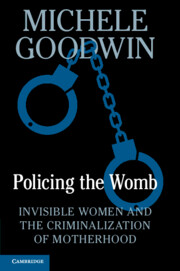Book contents
- Policing the Womb
- Policing the Womb
- Copyright page
- Dedication
- Contents
- Preface
- Acknowledgments
- 1 Introduction
- 2 Pregnancy and State Power
- 3 Creeping Criminalization of Pregnancy across the United States
- 4 Abortion Law
- 5 Changing Roles of Doctors and Nurses: Hospital Snitches and Police Informants
- 6 Revisiting the Fiduciary Relationship
- 7 Creating Criminals: Race, Stereotypes, and Collateral Damage
- 8 The Pregnancy Penalty: When the State Gets It Wrong
- 9 Policing Beyond the Border
- 10 Lessons for Law and Society: A Reproductive Justice New Deal or Bill of Rights
- 11 Conclusion
- Epilogue
- Notes
- Select Bibliography
- Index
6 - Revisiting the Fiduciary Relationship
Published online by Cambridge University Press: 07 February 2020
- Policing the Womb
- Policing the Womb
- Copyright page
- Dedication
- Contents
- Preface
- Acknowledgments
- 1 Introduction
- 2 Pregnancy and State Power
- 3 Creeping Criminalization of Pregnancy across the United States
- 4 Abortion Law
- 5 Changing Roles of Doctors and Nurses: Hospital Snitches and Police Informants
- 6 Revisiting the Fiduciary Relationship
- 7 Creating Criminals: Race, Stereotypes, and Collateral Damage
- 8 The Pregnancy Penalty: When the State Gets It Wrong
- 9 Policing Beyond the Border
- 10 Lessons for Law and Society: A Reproductive Justice New Deal or Bill of Rights
- 11 Conclusion
- Epilogue
- Notes
- Select Bibliography
- Index
Summary
Is it ethical when doctors breach their pregnant patients’ confidentiality? Is it legal? What about HIPAA (properly known as the Health Insurance Portability and Accountability Act of 1996)? Are there different rules for pregnant women than for men? These are some of the questions women ask me after I give a talk. I understand this bewilderment and, for many, fear. At the heart of their questions resides this chilling thought: Could this happen to me or my daughter? Depending on where they live, the answer may be yes. And, increasingly, wealth will not save them. As this Chapter explains, physicians owe their patients care, confidentiality, loyalty, and trust, and the principle that undergirds all of this – the fiduciary relationship – is not contingent on the sex of the patient. However, with increased pressure from state legislatures and prosecutors, some doctors and nurses have abrogated their responsibilities to their patients. Among them, some are genuinely fearful that unless they adhere to whatever law enforcement demands of them, they may lose their licenses to practice medicine. Some of these doctors are genuinely ambivalent about their duties. These doctors tell me they feel powerless.
Keywords
- Type
- Chapter
- Information
- Policing the WombInvisible Women and the Criminalization of Motherhood, pp. 98 - 113Publisher: Cambridge University PressPrint publication year: 2020

